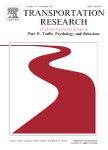版权所有:内蒙古大学图书馆 技术提供:维普资讯• 智图
内蒙古自治区呼和浩特市赛罕区大学西街235号 邮编: 010021

作者机构:Univ Maine VEMI Lab Orono ME USA Univ Maine Sch Comp & Informat Sci Spatial Comp Program VEMI Lab Orono ME USA
出 版 物:《TRANSPORTATION RESEARCH PART F-TRAFFIC PSYCHOLOGY AND BEHAVIOUR》 (Transp. Res. Part F Traffic Psychol. Behav.)
年 卷 期:2025年第114卷
页 面:99-117页
核心收录:
学科分类:0402[教育学-心理学(可授教育学、理学学位)] 08[工学] 0823[工学-交通运输工程]
主 题:Autonomous vehicles Trust Acceptance
摘 要:One of the most prevalent findings in the autonomous transportation literature is the strong connection between human trust and intentions to use autonomous vehicles (AVs). Indeed, trust is widely regarded as an essential antecedent for the adoption of AVs, a finding based primarily on survey-based methodologies. However, psychological theory has long suggested that self-reported measures of intention are fraught with contradiction - people often say one thing and do another. We examine this potential dichotomy here by experimentally characterizing the relationship between self-reported trust and behavioral decisions to use AVs. An initial survey of 444 participants assessed trust in AVs, identifying three trust categories: high, moderate, and low. Results demonstrated that people trust human rideshare drivers more than AVs. A subsequent in-lab behavioral study with 72 of these participants involved choosing a ride in an AV or a humandriven vehicle. Contrary to prevailing assumptions, our results reveal a deep chasm between intention and behavior: 97 % of participants, regardless of trust rating, chose to ride in the AV. This finding indicates that situational context, curiosity, and immediate circumstances heavily influence decision-making, mediating (and even overshadowing) self-reported trust levels. Employing Cognitive Dissonance Theory, we offer potential explanations for why participants reconciled their initial distrust with their subsequent actions. Our findings challenge the narrative that self-reported trust determines AV adoption and highlight the importance of situational factors in shaping user behavior. Using these results, we offer new insights and guidance for deploying AVs, suggesting that controlled, low-risk environments could facilitate broader acceptance of this emerging technology, providing a practical solution to the AV trust problem.